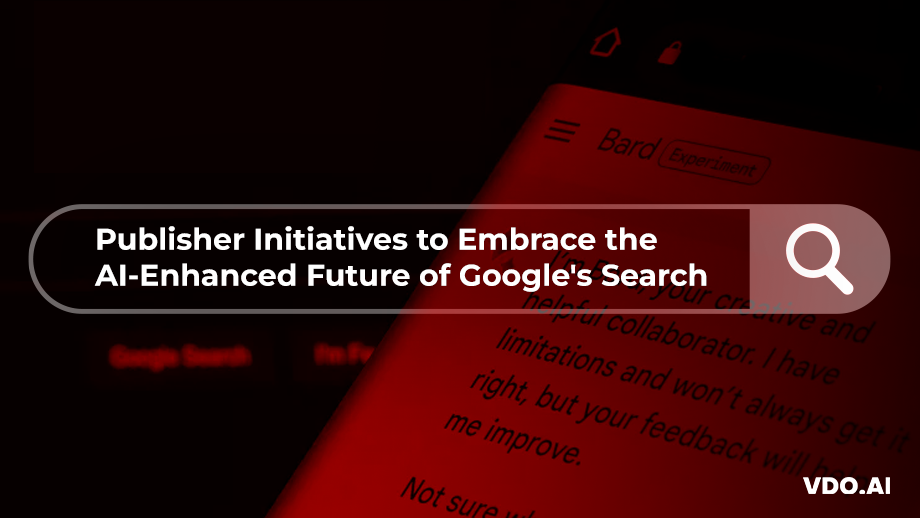Google is constantly innovating and improving its search technology with artificial intelligence (AI) to make search smarter, simpler, and more natural for users.
At its annual Google I/O event in May 2023, Google unveiled some of its latest AI-powered enhancements for search, such as the Search Generative Experience (SGE).
As a publisher, you can optimize your content and SEO strategy to embrace and benefit from these AI developments in Google’s search.
Here are some key initiatives publishers should implement:
Understanding SGE and Its Implications
SGE allows users to ask search queries in natural conversational language, and receive tailored responses, definitions, summaries, and other enhanced results.
Initially launched in English in the US, Google brought SGE to India and Japan this August, with plans for further international expansion in 2023.
A key implication for publishers is that SGE provides direct answers to many searches without requiring users to click through to other websites. This could divert traffic away from publishers. SGE may also impact rankings, as it favors content that satisfies user intent with comprehensive and authoritative information.
So while SGE delivers a better search experience, publishers need to adapt to remain competitive.
Optimizing for Natural Language Queries

A core focus for publishers is optimizing content to be discoverable by SGE’s conversational AI.
Adding natural language phrases and questions helps content match colloquial user queries. FAQ markup also allows search engines to interpret pages as answering specific questions.
A conversational tone that explains topics clearly and conversationally caters to how people naturally search. Using common phrases related to the subject boosts relevance.
Proactively answering iterative follow-up questions provides a complete informational resource. Anticipating user intent improves discoverability.
Monitoring search query trends reveals common question patterns. Search listening informs language and phrasing optimization.
Overall, a natural language approach enhances content’s ability to satisfy searchers’ needs.
Providing Rich, Multimedia Page Experiences
With SGE delivering summarized information directly in results, publishers need compelling page experiences to attract clicks.
Graphics, images, charts, videos, and other visual elements capture attention while improving understanding. Embedded media avoids extra steps to access content.
Tools like data visualizations, comparisons, calculators, and quizzes add interactive value. Table of contents plugins improves navigation through long posts.
Structured data markup enables search features like snippets, quick answers, and carousels powered by page content. This broadcasts pages’ value to search engines.
Immersive, multimedia content acts as a competitive advantage versus plain text.
Crafting In-Depth, Authoritative Content
For navigational and informational queries, SGE sources its responses from sites with comprehensive expertise. So focusing on in-depth content is key.
Thoroughly researched, expansive posts tend to satisfy and rank well for knowledge-focused searches. Avoid thin content only scratching the surface.
Original analysis, data, investigative reporting, and expert interviews demonstrate deep subject mastery. Linking reputable external sources also boosts credibility.
Updating evergreen content with new information, findings, and multimedia ensures recency and accuracy. This revitalizes existing resources.
Producing consistently high-quality, comprehensive content earns authority and relevance.
Adopting a Mobile-First Mindset

With Google prioritizing mobile-friendly pages, and over 60% of searches happening on smartphones, a mobile-first strategy is crucial.
Short paragraphs, minimal design, and responsive templates enhance readability on small screens.
Condensing information into scannable sections with toggles and accordions improves mobile UX.
Vertical video and images align with how mobile users view content. Faster page speeds also avoid abandonment.
Voice search presents another growing opportunity, and will be integrated into SGE. Optimizing content for voice assists extraction helps capitalize on this trend.
Analyzing SGE-Specific Performance Metrics
Understanding how content performs in SGE results provides crucial competitive intelligence.
Google Search Console reveals impressions, clicks, and rankings specifically for SGE search. Comparing this data to standard search performance indicates where AI-enhanced search favours or overlooks content.
Google Analytics helps track SGE traffic being driven to site content over time, highlighting areas for improvement.
Wider data from tools like RankScience and Moz give insight into how competitors’ content is performing through SGE.
User surveys, ratings, and reviews also provide feedback on how well content meets expectations in AI search.
Regular analysis of SGE metrics guides strategic optimization of content and SEO to maximize visibility and engagement in Google’s AI-enhanced search.
Final Thoughts
Google’s new AI-enhanced search poses an enormous shift for publishers reliant on search traffic. To stay relevant and discoverable, they must continuously analyze SGE behavior, craft authoritative multimedia content optimized for natural language, and track SGE-specific performance indicators. Publishers that successfully adapt their strategies stand to gain an edge as intelligent search becomes the norm.
Additionally, publishers can drive higher engagement and open up incremental revenue streams through VDO.AI’s suite of AI-optimized video ad formats are perfectly calibrated for each screen and channel.
Sign up now as a publisher at hello@vdo.ai to maximize lucrative ad monetization and turn your visitors into viewers today.







